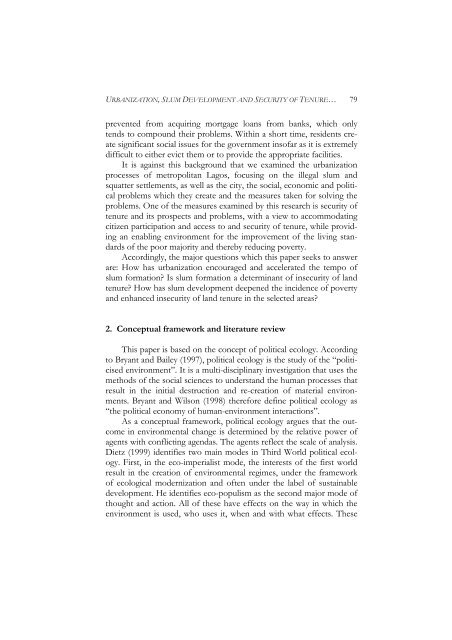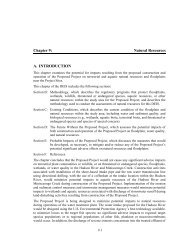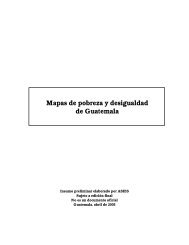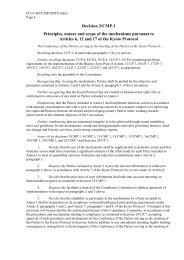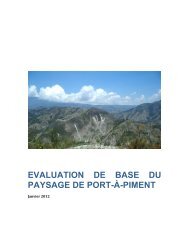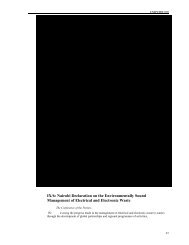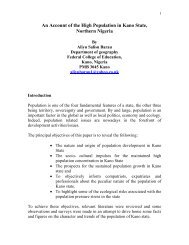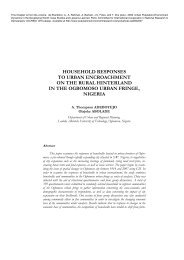urbanization, slum development and security of tenure - Center for ...
urbanization, slum development and security of tenure - Center for ...
urbanization, slum development and security of tenure - Center for ...
You also want an ePaper? Increase the reach of your titles
YUMPU automatically turns print PDFs into web optimized ePapers that Google loves.
URBANIZATION, SLUM DEVELOPMENT AND SECURITY OF TENURE… 79<br />
prevented from acquiring mortgage loans from banks, which only<br />
tends to compound their problems. Within a short time, residents create<br />
significant social issues <strong>for</strong> the government ins<strong>of</strong>ar as it is extremely<br />
difficult to either evict them or to provide the appropriate facilities.<br />
It is against this background that we examined the <strong>urbanization</strong><br />
processes <strong>of</strong> metropolitan Lagos, focusing on the illegal <strong>slum</strong> <strong>and</strong><br />
squatter settlements, as well as the city, the social, economic <strong>and</strong> political<br />
problems which they create <strong>and</strong> the measures taken <strong>for</strong> solving the<br />
problems. One <strong>of</strong> the measures examined by this research is <strong>security</strong> <strong>of</strong><br />
<strong>tenure</strong> <strong>and</strong> its prospects <strong>and</strong> problems, with a view to accommodating<br />
citizen participation <strong>and</strong> access to <strong>and</strong> <strong>security</strong> <strong>of</strong> <strong>tenure</strong>, while providing<br />
an enabling environment <strong>for</strong> the improvement <strong>of</strong> the living st<strong>and</strong>ards<br />
<strong>of</strong> the poor majority <strong>and</strong> thereby reducing poverty.<br />
Accordingly, the major questions which this paper seeks to answer<br />
are: How has <strong>urbanization</strong> encouraged <strong>and</strong> accelerated the tempo <strong>of</strong><br />
<strong>slum</strong> <strong>for</strong>mation? Is <strong>slum</strong> <strong>for</strong>mation a determinant <strong>of</strong> in<strong>security</strong> <strong>of</strong> l<strong>and</strong><br />
<strong>tenure</strong>? How has <strong>slum</strong> <strong>development</strong> deepened the incidence <strong>of</strong> poverty<br />
<strong>and</strong> enhanced in<strong>security</strong> <strong>of</strong> l<strong>and</strong> <strong>tenure</strong> in the selected areas?<br />
2. Conceptual framework <strong>and</strong> literature review<br />
This paper is based on the concept <strong>of</strong> political ecology. According<br />
to Bryant <strong>and</strong> Bailey (1997), political ecology is the study <strong>of</strong> the “politicised<br />
environment”. It is a multi-disciplinary investigation that uses the<br />
methods <strong>of</strong> the social sciences to underst<strong>and</strong> the human processes that<br />
result in the initial destruction <strong>and</strong> re-creation <strong>of</strong> material environments.<br />
Bryant <strong>and</strong> Wilson (1998) there<strong>for</strong>e define political ecology as<br />
“the political economy <strong>of</strong> human-environment interactions”.<br />
As a conceptual framework, political ecology argues that the outcome<br />
in environmental change is determined by the relative power <strong>of</strong><br />
agents with conflicting agendas. The agents reflect the scale <strong>of</strong> analysis.<br />
Dietz (1999) identifies two main modes in Third World political ecology.<br />
First, in the eco-imperialist mode, the interests <strong>of</strong> the first world<br />
result in the creation <strong>of</strong> environmental regimes, under the framework<br />
<strong>of</strong> ecological modernization <strong>and</strong> <strong>of</strong>ten under the label <strong>of</strong> sustainable<br />
<strong>development</strong>. He identifies eco-populism as the second major mode <strong>of</strong><br />
thought <strong>and</strong> action. All <strong>of</strong> these have effects on the way in which the<br />
environment is used, who uses it, when <strong>and</strong> with what effects. These


